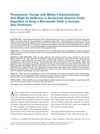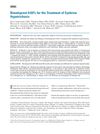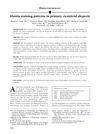 37 citations,
January 2016 in “Drug design, development and therapy”
37 citations,
January 2016 in “Drug design, development and therapy” Tofacitinib citrate is effective for moderate-to-severe chronic plaque psoriasis but has safety concerns at higher doses.
 27 citations,
May 2010 in “Dermatologic surgery”
27 citations,
May 2010 in “Dermatologic surgery” Photodynamic therapy with methyl 5-aminolevulinic acid is ineffective for treating alopecia totalis.
 July 2023 in “Journal of allergy and clinical Immunology. Global”
July 2023 in “Journal of allergy and clinical Immunology. Global” A 10-month-old boy with a rare combination of genetic conditions has severe immune deficiency and treatment challenges.
 39 citations,
January 2008 in “Journal of Endocrinology”
39 citations,
January 2008 in “Journal of Endocrinology” SCF and c-Kit decrease in AGA hair follicles, possibly affecting hair pigmentation and growth.
 4 citations,
December 2013 in “Archivio italiano di urologia, andrologia”
4 citations,
December 2013 in “Archivio italiano di urologia, andrologia” Dutasteride reduces hospitalization and prostate cancer risk compared to finasteride, potentially offsetting its higher cost.
 76 citations,
January 2017 in “World Journal of Stem Cells”
76 citations,
January 2017 in “World Journal of Stem Cells” Fat tissue cells are a promising option for healing various diseases, but more research is needed to ensure they are safe and effective.
 59 citations,
June 2022 in “Frontiers in medicine”
59 citations,
June 2022 in “Frontiers in medicine” There are still challenges in diagnosing and treating chronic skin diseases, but there is hope for future improvements.
107 citations,
June 1997 in “PubMed” EGFR is essential for normal hair development and follicle differentiation.
 April 2023 in “Dermatology practical & conceptual”
April 2023 in “Dermatology practical & conceptual” Tacrolimus solution is effective and well-tolerated for treating inflammatory scalp conditions.
October 2024 in “Dermatology and Therapy” 99 citations,
January 2004 in “Journal of Biological Chemistry” Methylprednisolone helps skin cells stick together better in pemphigus vulgaris.
 February 2025 in “Animals”
February 2025 in “Animals” Understanding proteins in skin structures like claws and hair is crucial for future research.
 43 citations,
December 2013 in “Stem Cells”
43 citations,
December 2013 in “Stem Cells” Stretching skin increases a certain protein that attracts stem cells, helping skin regeneration.
 November 2023 in “Dermatology and Therapy”
November 2023 in “Dermatology and Therapy” Baricitinib treatment helps regrow eyebrow, eyelash, and scalp hair in severe alopecia areata, improving patients' emotional well-being and quality of life.
 3 citations,
March 2023 in “JAAD case reports”
3 citations,
March 2023 in “JAAD case reports” Upadacitinib cleared scalp alopecia areata in three patients and also improved atopic dermatitis with minimal side effects.
6 citations,
November 1993 in “European journal of clinical pharmacology” Minoxidil is processed in the body by an enzyme found in the liver and platelets.
276 citations,
April 2003 in “Molecular endocrinology” Vitamin D is important for bones, hair, blood pressure, and breast development.
 31 citations,
July 2015 in “Clinical, Cosmetic and Investigational Dermatology”
31 citations,
July 2015 in “Clinical, Cosmetic and Investigational Dermatology” Hair restoration surgery effectively treats hair loss with natural-looking results, using techniques like stem cells and platelet-rich plasma.
 28 citations,
February 2016 in “International Journal of Nanomedicine”
28 citations,
February 2016 in “International Journal of Nanomedicine” Finasteride capsules with nanoparticles improve drug delivery, solubility, stability, and effectiveness.
 30 citations,
December 2017 in “Medical Hypotheses”
30 citations,
December 2017 in “Medical Hypotheses” The model suggests that scalp tension could lead to hair loss, with factors like blood vessel hardening, enlarged oil glands, and poor microcirculation also playing a role. It also hints at a possible link between skull shape and baldness pattern.
 34 citations,
February 2018 in “Drug Design Development and Therapy”
34 citations,
February 2018 in “Drug Design Development and Therapy” Bimatoprost is safe and effective for improving eyebrow hair.
 3 citations,
July 2020 in “Synthetic and Systems Biotechnology”
3 citations,
July 2020 in “Synthetic and Systems Biotechnology” Scientists improved an enzyme to better produce a hair growth-promoting chemical from an immunosuppressant.
 27 citations,
July 2018 in “Journal of optometry”
27 citations,
July 2018 in “Journal of optometry” Eyelashes protect the eyes, but more research is needed to understand how.
 7 citations,
April 2017 in “Dermatologic surgery”
7 citations,
April 2017 in “Dermatologic surgery” Hyaluronic acid fillers and combination treatments significantly improve facial defects from autoimmune diseases and are well-tolerated.
 4 citations,
December 2019 in “Minerva Urology and Nephrology”
4 citations,
December 2019 in “Minerva Urology and Nephrology” 5-alpha reductase inhibitors may reduce bladder cancer recurrence and improve survival.
15 citations,
October 2013 in “Journal of the American Academy of Dermatology” Vitiligo patients should be routinely screened for thyroid disease and, if extensive or prolonged, also for RA, PA, and type 2 diabetes.
 18 citations,
January 1998 in “Endocrine”
18 citations,
January 1998 in “Endocrine” RU58841, a nonsteroidal anti-androgen, showed potential as a topical treatment for hair loss, increasing hair density, thickness, and length without systemic side effects in Stumptailed Macaques.
 30 citations,
November 2013 in “Journal of The American Academy of Dermatology”
30 citations,
November 2013 in “Journal of The American Academy of Dermatology” Elastin staining helps assess late-stage scarring alopecia but is not definitive, and clinical diagnosis is still crucial.
 7 citations,
November 2013 in “Pediatrics in Review”
7 citations,
November 2013 in “Pediatrics in Review” Acne is a chronic skin condition not caused by poor hygiene or diet, and it requires long-term treatment and patient education.
 4 citations,
September 2020 in “Annals of Translational Medicine”
4 citations,
September 2020 in “Annals of Translational Medicine” Concentrated nanofat helps mice grow hair by activating skin cells and may be used to treat hair loss.
























